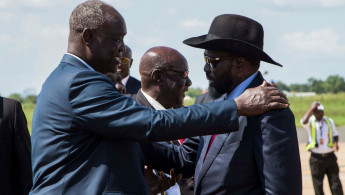Regional bloc invites S.Sudan rivals to Addis talks
The rivals in South Sudan's conflict have been invited to hold talks in Ethiopia's capital next week to nudge along a fragile peace deal that has suffered repeated setbacks, according to a letter seen Thursday by AFP.
The Intergovernmental Authority on Development (IGAD), a regional bloc for East Africa, extended the invitation on Wednesday to the two sides, led by President Salva Kiir and opposition leader Riek Machar.
The letter urges them to attend the May 2-3 talks in Addis Ababa to discuss "the implementation of the peace agreement and the way forward".
The peace deal, signed in September, put an end to much of the civil war that had ravaged the world's youngest nation since December 2013, killing 400,000 people and displacing four million.
But the formation of a transitional government combining both camps has not been forthcoming.
Machar - who fled the capital Juba in 2016 when a previous peace deal fell apart - has asked for a delay of six months, saying it was too unsafe for him to return.
Last weekend, Kiir called on Machar - his former vice president and an erstwhile ally in South Sudan's struggle for independence, to return to Juba from neighbouring Sudan.
Machar's continued absence would destroy the current peace accord, he warned.
The transitional government is meant to be formed by a May 12 deadline, with Machar once again taking up the post of vice president.
Government and opposition representatives confirmed to AFP they had received IGAD's invitation and they had the intention of participating in the talks.
But there were differences in what they expected.
For the government, the discussions needed to focus on "arrangements that will lead to the preparations of the formation of the transitional government in May," said a spokesman for South Sudan's foreign ministry, Mawien Makol.
But the head of one opposition group, Peter Mayen Majongdit, said the Addis talks should decide "whether the government will be formed or not" in May.
Earlier this month, Pope Francis knelt and kissed the feet of South Sudan's rival leaders to encourage them to strengthen the African country's peace process.
The pope asked South Sudan's president and opposition leader to proceed with the peace agreement despite mounting difficulties.
"I express my heartfelt hope that hostilities will finally cease, that the armistice will be respected, that political and ethnic divisions will be surmounted, and that there will be a lasting peace for the common good of all those citizens who dream of beginning to build the nation," the pope said in his statement.
The Vatican spiritual retreat brought together President Salva Kiir and opposition head Riek Machar as well as Kiir's three vice-presidents.
The South Sudanese leaders did not comment on the Pope's plea for peace.
The agreement was signed in September in Khartoum, the capital of neighbouring Sudan, but it has been delayed due to missed deadlines and continued fighting.
But in February, the UN's envoy for South Sudan said that conflict in the world's youngest nation has dramatically decreased, amid concerns about slowing peace talks.
David Shearer told reporters at the time that he was encouraged by "a number of positive things" - opposition members once at war now in the capital Juba participating in the peace process, more than 15 "peace meetings" across the country, and civilians in UN protected sites starting to return home.
Meanwhile, political turmoil in Sudan, where longtime president Omar al-Bashir - a prime architect of the South Sudan accord - was ousted two weeks ago, has raised fears that the peace deal could be weakened.
Follow us on Twitter: @The_NewArab





 Follow the Middle East's top stories in English at The New Arab on Google News
Follow the Middle East's top stories in English at The New Arab on Google News
![Israeli forces ordered bombed Gaza's Jabalia, ordering residents to leave [Getty]](/sites/default/files/styles/image_330x185/public/2176418030.jpeg?h=a5f2f23a&itok=_YGZaP1z)

